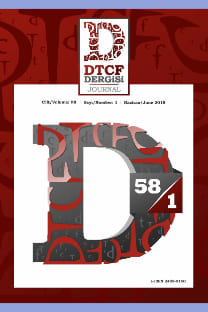ET-TAYYİB SALİH'İN “MEVSİMU'L-HİCRE İLE'Ş-ŞEMAL” ADLI ROMANININ TAHLİLİ
AN ANALYSIS OF AL-TAYYIB SALIH'S “MAWSIM AL-HIJRAH ILA AL-SHAMAL”
___
‘Abbûd, Şevḳî. Mu‘cemu Udebâ’u’l-‘Âlem. Vahran: Dâru’l-Muellif, 2016.Allen, Roger. The Arabic Novel an Historical and Critical Introduction. New York: Syracuse University Press, 1982.
Başer, K., Hüsnü Can ve Gerhard Buchbauer. Handbook of Essential Oils: Science, Technology, and Applications. New York: CRC Press, 2009.
Bauer, Thomas. Liebe und Liebesdichtung in der Arabischen Welt des 9. und 10. Jahrhunderts. Wiesbaden: Harrassowitz Verlag, 1998.
Benhayoun, Jamal Eddine. Narration, Navigation, and Colonialism: A Critical Account of Seventeenth- and Eighteenth-century English Narratives of Adventure and Captivity. Almanya: Peter Lang, 2006.
Bunson, Margaret R. Encyclopedia of Ancient Egypt. New York: Facts on File, 2002.
Cemîl b. Ma‘mer. Dîvânu Cemîl Buseyne, Beyrut: Dâru’ṣ-Ṣâdır, Tsz.
Elad-Bouskila, Ami. “Voices of Exiles and the Fictional Works of Tayeb Salih.” The Arab Diaspora: Voices of an Anguished Scream. Ed. Zahia Smail Salhi, Ian Richard Netton. Oxon: Routledge, 2006. 41-53.
Encyclopaedia Britannica: Britannica Book of the Year 2010. Ed. Karen Jacobs Sparks, Chicago-Londra: Encyclopaedia Britannica, Inc., 2010. 157.
Er, Rahmi. Çağdaş Arap Edebiyatı Seçkisi. Ankara: Vadi Yayınları, 2012.
Er, Rahmi. Modern Mısır Romanı I. Ankara: Hece Yayınları, 2015.
Fischer, Robert-Tarek. Österreich im Nahen Osten: die Grossmachtpolitik der Habsburgermonarchie im Arabischen Orient 1633-1918. Viyana-Köln-Weimar: Böhlau Verlag, 2006.
Ford, Ford Madox. Ford Madox Ford: Selected Poems. Ed. Max Saunders. New York: Routledge, 2003.
Gallagher, David. Metamorphosis: Transformations of the Body and the Influence of Ovid's Metamorphoses on Germanic Literature of the Nineteenth and Twentieth Centuries, Hollanda: Rodopi, 2009.
Grossman, Mark. World Military Leaders: A Biographical Dictionary. New York: Facts On File, 2007.
Hassan, Waïl S. “Tayeb Salih.” Encyclopedia of Postcolonial Studies. Ed. John Charles Hawley. Connecticut-Londra: Greenwood Press, 2001.
Hassan, Waïl S. Tayeb Salih: Ideology and the Craft of Fiction. New York: Syracuse University Press, 2003.
Hopkins, Peter Gwynvay. “Tayeb Salih's Bandarshah: A Great Arab Novel.” Kenana Handbook Of Sudan. Ed. Peter Gwynvay Hopkins. Oxon: Routledge, 2009. 527-551.
İbn Dureyd, Ebû Bekr Muhammed b. Hasan. el-İştiḳâḳ. (tah. Abdusselam Muhammed Harûn). Beyrut: Dâru’l-Cîl, 1411/1991.
Kalliney, Peter. Modernism in a Global Context. Londra-New York: Bloomsbury Publishing, 2016.
Koç, C. Turgut. Ṭayyib Ṣâliḥ ve Romancılığı. Basılmamış Doktora Tezi. Selçuk Üniversitesi Sosyal Bilimler Enstitüsü, 2004.
Köşeli, Yusuf. “Tayyib Sâlih'in Mevsimu'l-Hicre İla'ş-Şimâl Adlı Romanında Postkolonyal İzlekler.” Turkish Studies 8.12 (2013): 777-792.
Lentz, Harris M. Heads of States and Governments. New York: Routledge, 2013.
Mahfûz, Necib. Han el-Halili. Çev. Prof. Dr. Bedrettin Aytaç. İstanbul: Hit Kitap, 2011.
Mitchell, Timothy. “The Middle East in the Past and Future of Social Science.” The Politics of Knowledge: Area Studies and the Disciplines. Ed. David Szanton. Berkeley -Los Angeles-Londra: University of California Press, 2004. 74-119.
Olson, James Stuart. The Peoples of Africa: An Ethnohistorical Dictionary. West PortConnecticut-Londra: Greenwood Publishing Group, 1996.
Özyön, Arzu. “Postkolonyal Dünyada Sömürülenin İronik Olarak, Tanrılaştırılması: Karanlığın Yüreği ve Kuzeye Göç Mevsimi.” Uluslararası Sosyal Araştırmalar Dergisi 7.31 (2014): 241-245.
Salich, Tajjib. Zeit der Nordwanderung: Roman aus dem Sudan. Trans. Regina Karachouli. Basel: Lenos 1998. Ṣ âliḥ, eṭ-Ṭayyib. el-A‘mâlu’l-Kâmile. Beyrut: Dâru’l-‘Avde, 1996.
Salich, Tajjib. Mevsimu’l-Hicre ile’ş-Şemâli. Umm Durmân: Dâru’l-‘Ayni li’n-Neşr, 2005.
Salih, Tayeb. Kuzeye Göç Mevsimi. Çev. Adnan Cihangir. İstanbul: Ayrıntı Yayınları, 2011.
Salih, Tayeb. Saison de la migration vers le nord. Trans. Abdelwahabi Meddeb, Fady Noun. Fransa: Sindbad 1983.
Salih, Tayeb. Season of Migration to the North. Trans. Denys Johnson-Davies. Berkshire: Heinemann, 1991.
Sazyek, Hakan. Roman Terimleri Sözlüğü. 2. Basım. Ankara: Hece Yayınları, 2015.
Shoup, John A. The Nile: An Encyclopedia of Geography, History, and Culture. Santa Barbara, Denver: ABC-CLIO, 2017.
Tageldin, Shaden M. “The African Novel in Arabic”. The Cambridge Companion to the African Novel. Ed. F. Abiola Irele. Cambridge: Cambridge University Press, 2009. 85-103.
el-Tayib, Abdulla. “Pre-Islamic Poetry.” Arabic Literature to the End of the Umayyad Period. Ed. Alfred Felix Landon Beeston. Cambridge: Cambridge University Press, 1983. 27-113.
Tuzcu, Kemal. “Arap Şiirinde Recezin Ortaya Çıkışı.” Nüsha Şarkiyat Araştırmaları Dergisi 34.I (2012): 31-44.
- ISSN: 0378-2905
- Yayın Aralığı: 2
- Başlangıç: 1942
- Yayıncı: Ankara Üniversitesi Dil ve Tarih-Coğrafya Fakültesi
TARİH'TE HORASAN'IN YERİ (İSLAMİYET DÖNEMİ)
PSYCHOMETRIC PROPERTIES OF THE RESPONSIBILITY SCALE
MERVE TOPCU, Burak ÖGE, FARUK GENÇÖZ
HERKES VE ORTALAMA HERGÜNKÜLÜK: VIRGINIA WOOLF'UN “DALGALAR” ROMANINA HEİDEGGERCİ BİR YAKLAŞIM
ARDAHAN'IN ÇILDIR İLÇESİNDEKİ SUHARA KÖYÜ CAMİİ'NE AİT ARŞİV BELGELERİ
'BİZ DE, KENDİ ÇAPIMIZDA AVRUPAYIZ': KÜRESELLEŞME IŞIĞINDA DAVID GREIG'İN AVRUPA ADLI OYUN
IN THE EYE OF THE BEHOLDER: MATTIE SILVER IN EDITH WHARTON'S ETHAN FROME
WHEN MAGIC IS REPLACED WITH SCIENCE: SCIENCE 1POEMS OF DAVID MORLEY
